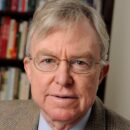On April 28-29, 2022, the Wharton Pension Research Council held its annual symposium, “Real-World Shocks and Retirement System Resiliency.”
Co-hosted by John Sabelhaus of the Brookings Institute; Stephen Utkus, current Visiting Scholar with the Pension Research Council, and Wharton Prof. Olivia S. Mitchell, this was the third time the conference was held online.
Session I, moderated by John Sabelhaus of the Brookings Institute, was “Labor Market Shocks: Scarring the Future?”

Richard Johnson of Urban Institute presented “How Gloomy Is the Retirement Outlook for Millennials?” This paper was co-authored by Karen Smith, also of Urban Institute. Johnson reported on the recent trends threatening financial security for future generations. He shared their latest projections, suggesting that, on average, millennials will receive more income in retirement than previous generations, but more millennials may see their living standards fall when they retire.

Erika McEntarfer of the U.S. Census Bureau presented “Older Workers, Retirement, and Macroeconomic Shocks.” McEntarfer explained that the pandemic increased the retirement transition rate by an excess five percentage points, much larger than the impact of the great recession. If these workers do not return to the workforce, labor markets may remain tight for some time.

Courtney Coile of Wellesley College presented “Recessions and Retirements: New Evidence from the COVID-19 Pandemic.” This paper was co-authored by Haiyi Zhang of MIT. Coile shared that though retirements rose during the pandemic, this was mainly for reasons other than local economics or local COVID conditions; instead, common national factors mattered, like health concerns, government policies, or stock market gains.
The Session I discussant was Peter Brady of the Investment Company Institute.
Session II, moderated by Olivia Mitchell of the Pension Research Council, was “The Changing Financial Environment and Retirement Security.”

Alice Henriques Volz of the Federal Reserve Board presented “Wealth Inequality and Retirement Preparedness: A Cross-Cohort Perspective,” co-authored by John Sabelhaus of the Brookings Institute. Volz shared her findings that some low-wealth individuals trail their predecessors in terms of retirement preparedness, so social security solvency will be more important for these cohorts.

Jacob Mortenson of the United States Congressional Joint Committee on Taxation presented “Changes in Retirement Savings During the COVID Pandemic.” This paper was co-authored by Elena Derby and Kathleen Mackie also of the United States Congressional Joint Committee on Taxation, and Lucas Goodman of the United States Treasury, Office of Tax Analysis. Mortenson shared that although retirement saving contributions did not meaningfully decline, IRA rule changes during COVID induced slower withdrawals by those over 72 and faster for those under age 60.

Lisa Dettling of the Federal Reserve Board presented “Saving and Wealth Accumulation among Student Borrowers: Implications for Retirement Preparedness,” co-authored by Sarena F. Goodman and Sarah Reber, also of the Federal Reserve Board. Dettling addressed the question: Are student loan borrowers saving less for retirement than their peers? She shared that research finds wealth accumulation of student borrowers mirrors that in other college-educated families.
The Session II discussant was Victoria Bryant of the Internal Revenue Service.

Our Keynote Speaker for Day 1 was Ulrike Malmendier of the University of California, Berkeley. Malmendier presented “The Longlasting Effects of Crises and Other Past Experiences on Expectations.” In her presentation, Malmendier traced the scarring effects of past shocks on economic decision making. This session was moderated by Debra Whitman of AARP.
Session III, moderated by Karen Dynan of Harvard University, was “Real-World Shocks and Policy Developments.”

Robert Moffitt of Johns Hopkins University presented “The Safety Net Response to the Covid-19 Pandemic Recession and the Older Population.” This paper was co-authored by James Ziliak of the University of Kentucky. Moffitt explained how the U.S. social safety net provided major support to older men and women during the pandemic.

Louise Sheiner of the Brookings Institute presented “Retirement Security and Health Costs” co-authored by Glenn Follette of the Federal Reserve Board. Sheiner and Follette found that the slowdown in U.S. health spending from 2010-2019, largely the result of the ACA, boosted the well-being of low-income seniors.

Kathleen Mullen of the University of Southern California presented “Economic Conditions, the COVID-19 Pandemic Recession, and Implications for Disability Insurance.” This paper was co-authored by Nicole Maestas of Harvard Medical School. Mullen shared that, two years into the pandemic, it’s still too soon to tell how COVID-19 will affect U.S. disability programs in the long run.
The Session II discussant was Chris Wheat of JPMorgan Chase Institute.

Our Keynote Speaker for Day 2 was David Knox of Mercer. Knox presented “Learnings About the Resiliency and Objectives of Pension Systems.” Knox offered lessons about retirement system resilience: public pensions will play a smaller role in future retirement systems and individuals will require more guidance and advice for retirement planning. This session was moderated by Sudipto Banerjee of T. Rowe Price.


